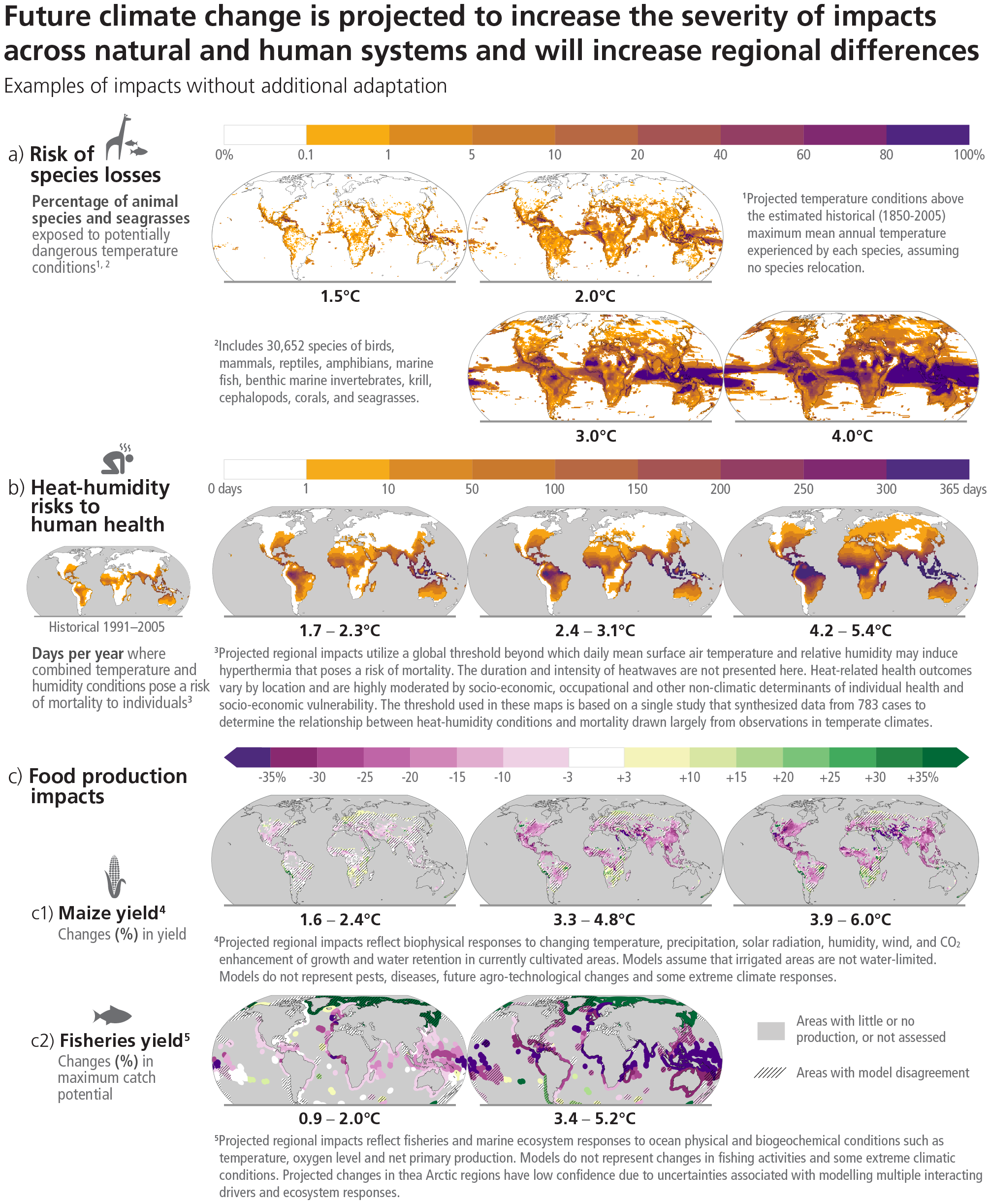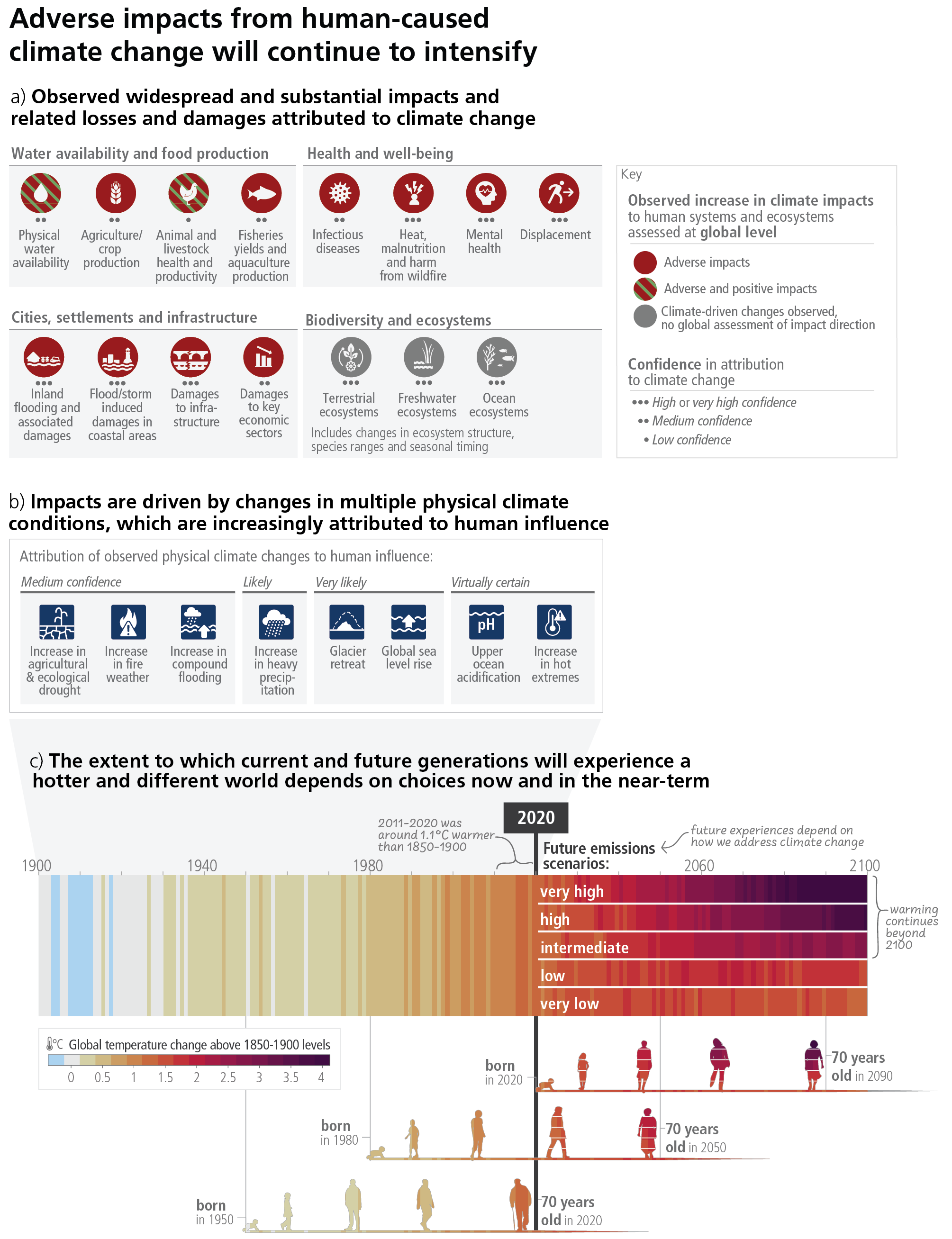ForumIAS announcing GS Foundation Program for UPSC CSE 2025-26 from 19 April. Click Here for more information.
ForumIAS Answer Writing Focus Group (AWFG) for Mains 2024 commencing from 24th June 2024. The Entrance Test for the program will be held on 28th April 2024 at 9 AM. To know more about the program visit: https://forumias.com/blog/awfg2024
Contents
- 1 Introduction
- 2 What is an IPCC Synthesis Report?
- 3 About the IPCC and their reports
- 4 What are the key findings of the IPCC’s Synthesis Report?
- 5 What are the key findings of the IPCC’s Synthesis Report on India?
- 6 What are the suggestions provided by the IPCC’s Synthesis Report?
- 7 What are the suggestions provided by the IPCC’s Synthesis Report for India?
- 8 Conclusion
| For 7PM Editorial Archives click HERE → |
Introduction
The Intergovernmental Panel on Climate Change (IPCC) released its final report of the sixth assessment cycle, titled “AR6 Synthesis Report: Climate Change 2023”. It emphasises the dangers that climate change brings to human and planetary well-being. The report synthesises findings from multiple working groups and special reports and underscores the urgency of taking more ambitious action to secure a liveable and sustainable future for all.
What is an IPCC Synthesis Report?
The Synthesis Report (SYR) is the culmination of a cycle of reports (the Sixth Assessment) that have been published over the past five years.
| Must read: Synthesis Report: IPCC meet in Switzerland: The significance, likely impact |
About the IPCC and their reports
The Intergovernmental Panel on Climate Change (IPCC) produces assessment reports that are the most comprehensive scientific evaluations of the state of the earth’s climate.
| Must read: About the IPCC and their reports |
What are the key findings of the IPCC’s Synthesis Report?

The key findings of the IPCC’s Synthesis Report of the Sixth Assessment Cycle (AR6) are
Carbon dioxide(CO2) emissions: a) Emissions reductions have been less than emissions increased from rising global activity levels in the industry, energy supply, transport, agriculture and buildings, b) Least developed countries (LDCs) and Small Island Developing States (SIDS) have much lower per capita emissions (1.7 tCO2-eq and 4.6 tCO2-eq, respectively) than the global average (6.9 tCO2-eq), c) The 10% of households with the highest per capita emissions contribute 34–45% of global consumption-based household GHG emissions, while 9 the bottom 50% contribute 13–15%.
Impact of Human-induced climate change: a) Increasing weather and climate extreme events have caused millions of people to suffer from acute food insecurity and reduced water security, especially in Africa, Asia, Central and South America, LDCs, small islands, the Arctic, and globally for Indigenous Peoples, small-scale food producers, and low-income households, b) Human influence has warmed the atmosphere, ocean and land. Global mean sea level increased by 0.20 [0.15–0.25] m between 1901 and 2018, c) Evidence of observed changes in extremes such as heat waves, heavy precipitation, droughts, and tropical cyclones, and, in particular, their attribution to human influence, has further strengthened since AR5.
Lowered agricultural productivity: Although overall agricultural productivity has increased, climate change has slowed this growth over the past 50 years globally, with related negative impacts mainly in mid- and low-latitude regions but positive impacts in some high-latitude regions.
Adverse impact on health: Climate-related food-borne, water-borne, and vector-borne diseases have increased. Some mental health challenges are associated with increasing temperatures, trauma from extreme events, and loss of livelihoods and culture.
Economic damages: It has been detected in climate-exposed sectors, such as agriculture, forestry, fishery, energy, and tourism. Individual livelihoods have been affected through, for example, destruction of homes and infrastructure, loss of property and income, human health and food security, with adverse effects on gender and social equity.
Impact on the urban ecosystem: Extreme and slow-onset catastrophes have damaged urban infrastructure, including transportation, water, sanitation, and energy systems, causing economic losses, service interruptions, and well-being issues. Urban poor are most affected.

Current progress in Adaptation: a) Progress in adaptation planning and implementation has been observed across all sectors and regions, generating multiple benefits, b) Ecosystem-based adaptation measures such as urban greening, restoration of wetlands, and upstream forest ecosystems have been helpful in decreasing flood hazards and urban heat, c) Combinations of non-structural measures like early warning systems and structural measures like levees have reduced the loss of life in cases of inland flooding, d) Key barriers to adaptation are limited resources, lack of private sector and citizen engagement, insufficient mobilisation of finance, low climate literacy, lack of political commitment, limited research and/or slow and low uptake of adaptation science, and low sense of urgency.
Climate finance: a) The majority of global climate financing went to mitigation, while a small part went to adaptation, b) Although global monitored climate finance has increased since AR5, current global financial flows for adaptation, including public and private sources, are insufficient and limit adaptation alternatives, especially in developing countries, c) Public and private finance flows for fossil fuels are still greater than those for climate adaptation and mitigation
Current Mitigation Progress: Several mitigation options are becoming increasingly cost-effective and are generally supported by the public. For example, from 2010–2019, there have been sustained decreases in the unit costs of solar energy (85%), wind energy (55%), and lithium-ion batteries (85%) and large increases in their deployment, e.g., >10x for solar and >100x for electric vehicles (EVs), varying widely across regions.
| Read more: IPCC AR 6 Synthesis Report |
What are the key findings of the IPCC’s Synthesis Report on India?
Key finding of the IPCC Synthesis Report on India are : a) India faces the highest risk from the impact of climate change, despite contributing less than 5% of historical greenhouse gas emissions, b)The impacts of climate change are already being felt in melting glaciers, heat waves, and cyclones, which have affected wheat output and led to milk shortages, c) India is the world’s third-largest emitter of greenhouse gases, primarily from coal, and its per capita emissions have increased by 36% since 2011, d) While India is taking action to invest in green hydrogen and renewable energy, policy flip-flops and fluctuating gas prices have slowed progress, e) RE sources account for only about 11 per cent of power generation, though they are a little over 40 per cent of the installed capacity, and f) India’s net-zero commitment by 2070 remains uncertain.
What are the suggestions provided by the IPCC’s Synthesis Report?
General Suggestions of the IPCC’s Synthesis Report are,
Follow the principles of climate justice: Urgent and rapid climate actions are needed by developed countries based on the principles of climate justice and equity, both in terms of emissions reduction and the mobilization of finance and technology to developing countries.
Requires deep and rapid reductions CO2: CO2 is the primary greenhouse gas and needs to be drastically reduced. Reaching net zero CO2 or GHG emissions requires deep and rapid reductions in gross emissions of CO2, as well as substantial reductions of non-CO2 GHG emissions.
Need International cooperation: It is a critical enabler for achieving ambitious climate change mitigation, adaptation, and climate-resilient development. Climate-resilient development is enabled by increased international cooperation, including mobilizing and enhancing access to finance, particularly for developing countries, vulnerable regions, sectors, and groups, and aligning finance flows for climate action to be consistent with ambition levels and funding needs.
Need, effective, and equitable mitigation and adaptation actions: Climate change increasingly threatens ecosystems, biodiversity, and the health and wellbeing of current and future generations. Accelerated mitigation and implementation of adaptation actions in the near term would reduce projected losses and damages for humans and ecosystems.
Find other avenue of finance: Apart from public finance (includes the promised but never received $100 billion), other avenues including private finance, local finance, national and international, bilateral, and multilateral finance need to be explored.
Diversified knowledge: The strategies to counter climate change needed to be rooted in diverse values, including scientific knowledge, indigenous knowledge and local knowledge.
What are the suggestions provided by the IPCC’s Synthesis Report for India?
Incentivize investment: India needs to incentivize investment in green hydrogen, renewable energy, and natural gas to reduce emissions.
Strengthen its policy framework: Because its policy flip-flops have sharply curtailed renewable energy potential.
Relax import duties: The government needs to relax import duties on solar equipment imports and expand the Approved List of Modules and Manufacturers to accelerate the addition of solar capacity.
Minimise the coal use: India needs to address its reliance on coal and work towards transitioning to cleaner energy sources.
Conclusion
IPCC Synthesis Report highlights the urgent need for rapid climate actions based on the principles of climate justice and equity. The report reiterates India’s stance that development is the first line of defense against climate change. It emphasises that the developed countries must take the lead in reducing emissions and mobilizing finance and technology for developing nations. The report recognizes the interdependence of climate, ecosystems, biodiversity, and human societies and emphasizes the importance of international cooperation to achieve ambitious climate change mitigation and adaptation. The report also supports the idea of promoting environmentally friendly lifestyles to protect and preserve the environment.
Sources: IPCC Report, IPCC, PIB, The Hindu, Business Standard(Article 1 and Article 2) and Times of India.
Syllabus: GS 3: Environment and Bio-diversity – Conservation.




